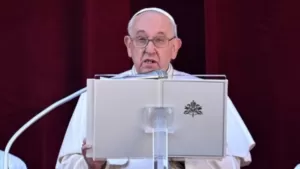Easter 2025: A Sacred Journey Through Passion Holy Week

As the Christian world prepares for Easter Sunday on April 20, 2025, the week leading up to this pivotal celebration—known as Passion Week or Holy Week—holds profound significance. Beginning with Palm Sunday on April 13 and culminating in the joyous resurrection of Jesus Christ, this sacred period invites believers to reflect on the final days of Jesus’ earthly ministry, his sacrificial death, and his triumph over death. For millions worldwide, Passion Week is a time of spiritual renewal, communal worship, and deep contemplation.
The Start of Passion Week: Palm Sunday (April 13, 2025)
Passion Week commences with Palm Sunday, marking Jesus’ triumphal entry into Jerusalem. According to the Gospels, crowds welcomed Jesus by waving palm branches and laying their cloaks on the ground, proclaiming him as the Messiah with shouts of “Hosanna!” This moment, filled with hope and expectation, sets the tone for the week ahead. In 2025, churches will reenact this event with processions, palm distributions, and readings from scriptures like Matthew 21:1-11. For many, Palm Sunday is a reminder of Jesus’ kingship, not as a political conqueror but as a servant leader who came to redeem humanity.
The Journey Through the Week
Each day of Passion Week carries unique significance, drawing Christians into the narrative of Jesus’ final days:
- Holy Monday and Tuesday (April 14-15, 2025): These days focus on Jesus’ teachings and actions in Jerusalem. On Monday, many recall the cleansing of the temple (Mark 11:15-17), where Jesus overturned the tables of money changers, condemning their exploitation. Tuesday is often associated with his teachings on faith, love, and the coming kingdom, including parables like the Widow’s Mite (Mark 12:41-44). Some denominations hold special services to reflect on these moments of moral clarity and compassion.
- Spy Wednesday (April 16, 2025): This day highlights the betrayal of Jesus by Judas Iscariot, one of his disciples, who agreed to hand him over to the authorities for thirty pieces of silver (Matthew 26:14-16). The somber tone of Spy Wednesday prepares believers for the escalating tension of the Passion narrative. In some traditions, Tenebrae services—marked by darkness and silence—begin to foreshadow the sorrow to come.
- Maundy Thursday (April 17, 2025): Derived from the Latin mandatum (commandment), Maundy Thursday commemorates the Last Supper, where Jesus instituted the Eucharist and washed his disciples’ feet, modeling servant leadership (John 13:1-17). He also gave the new commandment to “love one another” (John 13:34). Churches hold evening services, often including foot-washing rituals and Holy Communion, to honor these acts. The mood shifts as Jesus’ arrest looms, with some congregations keeping vigil into the night, recalling his agony in the Garden of Gethsemane.
- Good Friday (April 18, 2025): The most solemn day of the Christian calendar, Good Friday marks Jesus’ crucifixion and death. Services focus on the Passion narrative (John 18-19), with readings, hymns, and prayers that recount his trial, suffering, and sacrifice on the cross. Many churches hold services from noon to 3 p.m., symbolizing the hours Jesus hung on the cross. Practices like the Stations of the Cross, fasting, and silent reflection emphasize the weight of his redemptive act. For Christians, Good Friday is a day of mourning but also gratitude, as Jesus’ death is seen as the ultimate expression of God’s love.
- Holy Saturday (April 19, 2025): A day of quiet waiting, Holy Saturday represents the time Jesus lay in the tomb. While less liturgically prominent, it is a time for contemplation and preparation for Easter. Some churches hold Easter Vigil services at dusk, transitioning from darkness to light as they anticipate the resurrection. These vigils often include baptisms, scripture readings, and the first proclamation of “Christ is risen!”
The Culmination: Easter Sunday (April 20, 2025)
Easter Sunday is the cornerstone of the Christian faith, celebrating Jesus’ resurrection from the dead. Churches will fill with joyous hymns, such as “Christ the Lord is Risen Today,” and proclamations of “Alleluia!” The resurrection, detailed in all four Gospels (Matthew 28, Mark 16, Luke 24, John 20), signifies victory over sin and death, offering hope and eternal life to believers. Services range from sunrise gatherings to elaborate liturgies, with many congregations decorating sanctuaries with lilies and white vestments symbolizing purity and new life. Easter 2025 will also see families and communities come together for traditions like egg hunts, feasts, and charitable acts, reflecting the spirit of renewal.
Global Observances and Traditions
Passion Week is observed differently across Christian denominations and cultures, yet its core remains universal. In Roman Catholicism, the week is marked by elaborate rituals, including the Chrism Mass, Palm Sunday processions, and the Easter Triduum (Maundy Thursday through Easter). Orthodox Christians, following the Julian calendar, may celebrate Easter later (May 4 in 2025), with unique traditions like the midnight Paschal liturgy. Protestant churches emphasize scripture and preaching, often simplifying rituals while focusing on the Passion narrative. In regions like the Philippines, Latin America, and Europe, public processions, reenactments, and penitential practices bring the story to life.
For example, in Jerusalem’s Old City, pilgrims walk the Via Dolorosa, retracing Jesus’ steps to the cross. In Spain, Semana Santa features dramatic processions with ornate floats depicting scenes from the Passion. In Ethiopia, Fasika (Easter) follows a 55-day fast, culminating in vibrant celebrations. These diverse expressions underscore the global resonance of Holy Week.
A Time for Reflection and Renewal
In 2025, as Christians enter Passion Week on April 13, they are invited to journey through the spectrum of human experience—joy, betrayal, sacrifice, and triumph. Whether through fasting, prayer, or acts of service, believers seek to draw closer to the heart of their faith. For many, the week is not just a historical commemoration but a living encounter with the story that shapes their worldview.
As the world navigates ongoing challenges—social, environmental, and personal—Passion Week offers a timeless message of hope. The cross speaks to suffering and redemption, while the empty tomb proclaims that despair is not the final word. On April 20, 2025, when Christians proclaim “Christ is risen,” they will affirm a faith that has endured for centuries, uniting them in a shared vision of love and resurrection.





